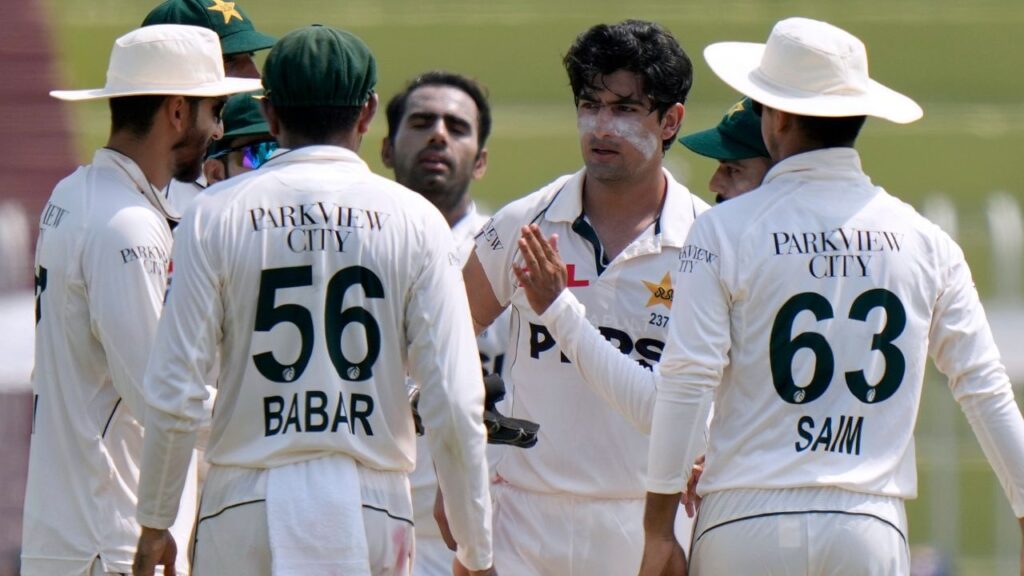Pakistan’s cricket team continues to struggle in the international arena, finding itself in a downward spiral of disappointing performances. Following a series of setbacks, including defeats in the Asia Cup last year, the ODI World Cup, a clean sweep in a Test series against Australia, and embarrassment in this year’s T20 World Cup, the team has added yet another chapter of disgrace to its storied history. In a shocking turn of events, Pakistan suffered its first-ever Test defeat to Bangladesh on home soil, losing by a staggering 10 wickets. This ignominious performance under the captaincy of Shan Masood has sparked outrage among fans and critics alike, leading to severe criticism of the players. Former chairman of the Pakistan Cricket Board, Ramiz Raja, has publicly exposed the team’s fast bowlers, attributing their poor performance to the impact of defeats against India.
The Decline of Pakistani Pace Bowling
In the Rawalpindi Test, the Pakistani team opted for a four-man pace attack, a decision that drew skepticism even before the match began. With the bowling spearheaded by Shaheen Afridi and Naseem Shah, supported by Khurram Shehzad and Mohammad Ali, expectations were high. However, none of the bowlers made a significant impact. Their lackluster performance was further compounded by an alarming decline in speed, particularly that of the left-arm speedster, Shaheen Afridi, whose recent struggles have raised doubts among fans and analysts. Unfazed, the Bangladeshi batsmen made quite the statement, effortlessly scoring 565 runs in their first innings.
Confidence Shattered by Team India
Historically, Pakistan has boasted an impressive lineup of pace bowlers, with legends like Wasim Akram, Waqar Younis, Imran Khan, and Shoaib Akhtar. However, the current pace department’s performance has left many questioning their capability. Ramiz Raja believes that a significant factor contributing to the lack of confidence among the fast bowlers stems from their crushing losses against the Indian side. He stated that the reputation that once made these bowlers central to the team’s strategy has diminished, along with their self-belief.
Beginning of the Downward Spiral
Ramiz pointed to the match during last year’s Asia Cup as a turning point. During this heavily scrutinized game played in Colombo, Sri Lanka, the Indian team mercilessly dismantled the Pakistani bowling attack, amassing 356 runs. Virat Kohli and KL Rahul both delivered remarkable centuries, with Rohit Sharma and Shubman Gill contributing brisk half-centuries as Pakistan suffered a staggering 228-run defeat. This match not only shattered Pakistan’s confidence but also informed global cricketers that they could bully the once-feared Pakistani bowlers.
Recent Performance Overview
| Match | Opponent | Result | Score |
|---|---|---|---|
| Asia Cup 2023 | India | Loss | Pakistan 128; India 356 |
| ODI World Cup 2023 | Various | Loss | N/A |
| Test Series vs Australia | Australia | Loss | N/A |
| T20 World Cup 2023 | Various | Loss | N/A |
| Test vs Bangladesh | Bangladesh | Loss | Pakistan 0 & 190; Bangladesh 191 |
The Road Ahead for Pakistan Cricket
The onus is now on the Pakistan cricket management to reassess their strategy and focus on revitalizing their pace attack and fostering a culture of confidence within the team. With the ICC Cricket World Cup approaching, changes must be made to ensure they can compete at the highest level and restore their reputation as a formidable cricketing nation. Comprehensive training, mental conditioning, and perhaps even a change in personnel may be necessary to bring the glory back to Pakistan cricket.
